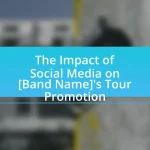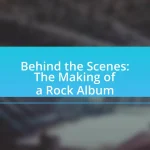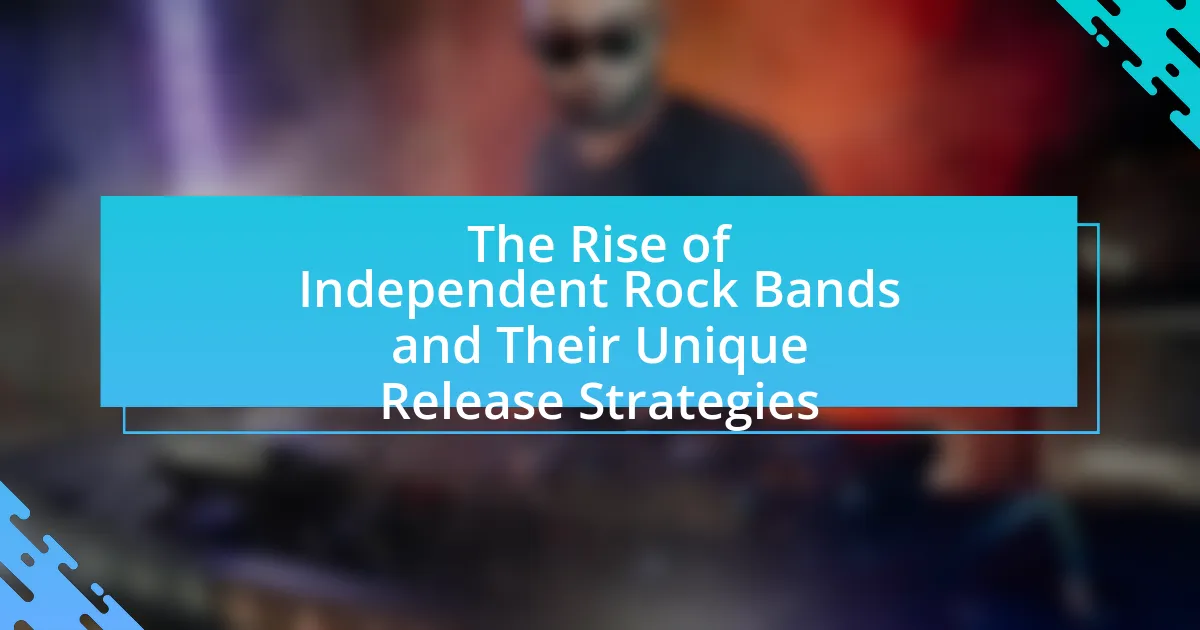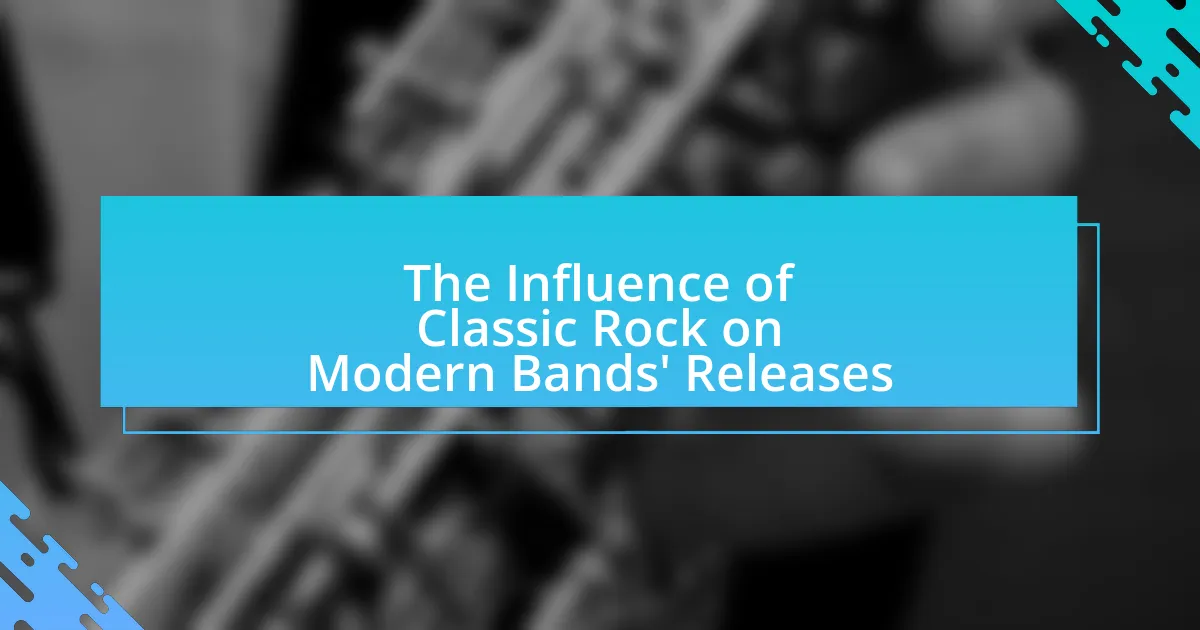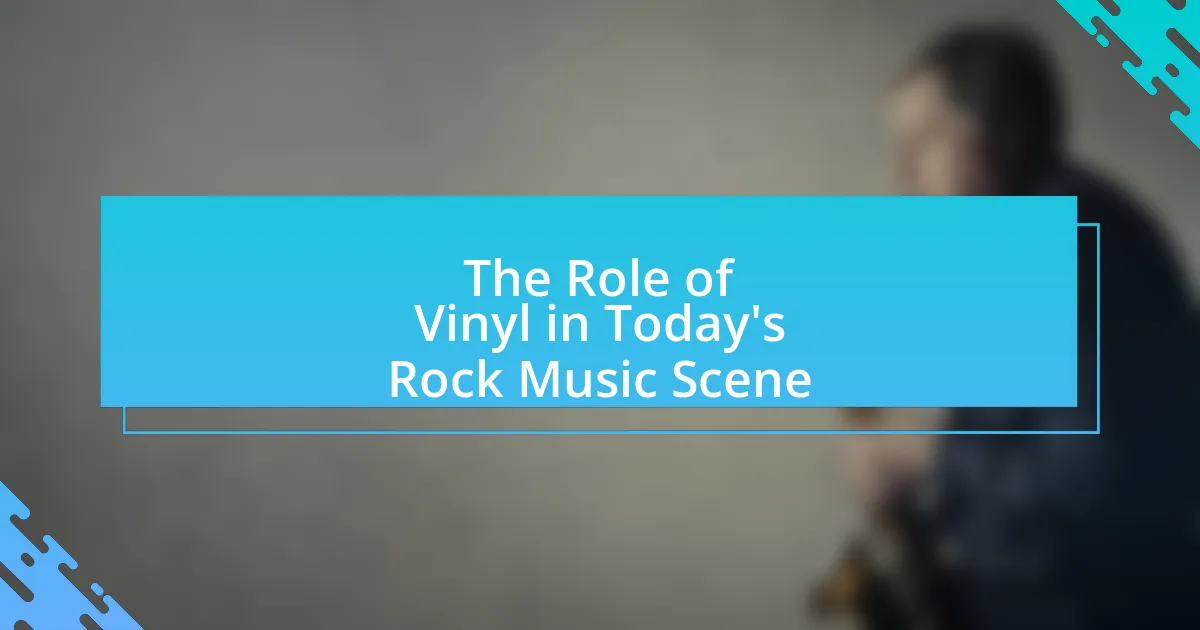The article focuses on the notable comebacks of iconic rock bands in recent history, highlighting the reunions of Guns N’ Roses, My Chemical Romance, and the Red Hot Chili Peppers, among others. It examines the impact of these comebacks on the music industry, including increased album sales, concert ticket sales, and the influence on younger artists. Additionally, the article discusses emerging trends such as nostalgia-driven marketing, collaborations with contemporary artists, and the role of fan engagement in determining the success of these returns. It also analyzes recent critically acclaimed releases and the themes present in new music, emphasizing how nostalgia and social media play crucial roles in maintaining relevance in today’s music scene.
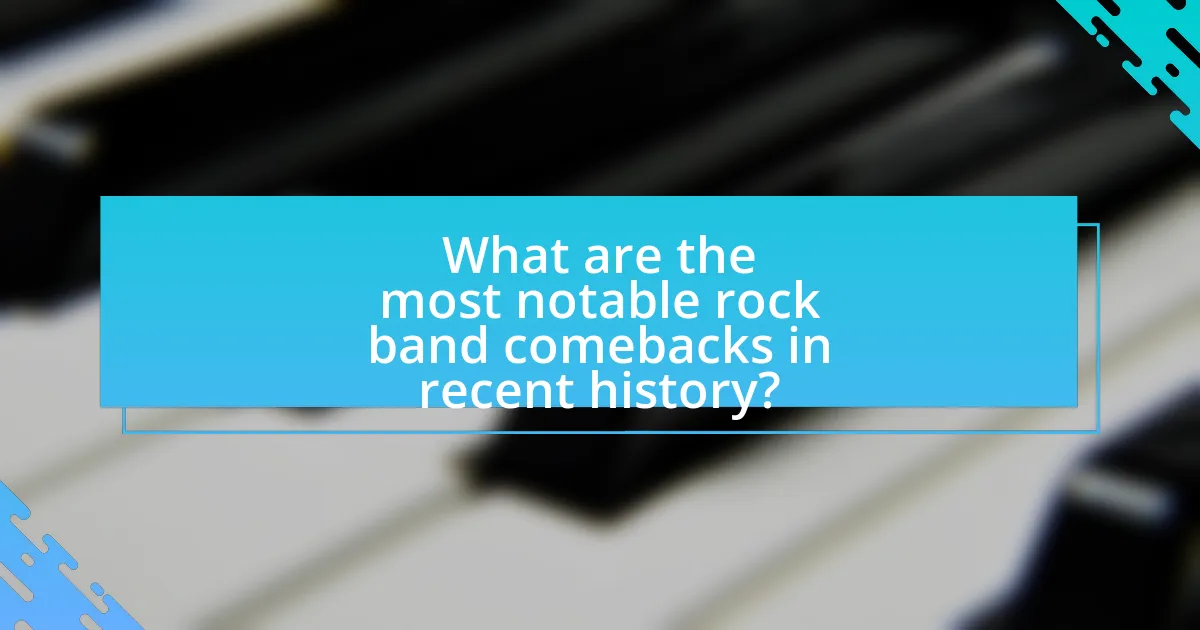
What are the most notable rock band comebacks in recent history?
Notable rock band comebacks in recent history include the return of Guns N’ Roses, who reunited with original members for their “Not in This Lifetime” tour starting in 2016, generating significant ticket sales and fan excitement. Another example is the band My Chemical Romance, which announced their reunion in 2019 after a six-year hiatus, leading to sold-out shows and a highly anticipated tour. Additionally, the Red Hot Chili Peppers released their album “Unlimited Love” in 2022, marking the return of guitarist John Frusciante and receiving critical acclaim. These comebacks have revitalized interest in the bands and showcased their enduring popularity in the rock genre.
How have these comebacks impacted the music industry?
Recent comebacks of iconic rock bands have significantly revitalized the music industry by increasing album sales and streaming numbers. For instance, the return of bands like Fleetwood Mac and Guns N’ Roses has led to a resurgence in interest, with Fleetwood Mac’s “Rumours” re-entering charts and achieving multi-platinum status again. This trend has also spurred a rise in concert ticket sales, as nostalgia-driven tours attract both old fans and new listeners, contributing to a booming live music sector. Additionally, these comebacks have influenced younger artists, prompting them to incorporate classic rock elements into their music, thereby bridging generational gaps and expanding the genre’s reach.
What trends have emerged from these iconic returns?
Recent iconic returns of rock bands have revealed trends such as a resurgence of vinyl releases, collaborations with contemporary artists, and a focus on nostalgia-driven marketing. The revival of vinyl, evidenced by a 2022 report from the Recording Industry Association of America showing vinyl sales surpassing CD sales for the first time since the 1980s, highlights a growing consumer preference for physical formats. Collaborations, like those seen in recent albums from bands such as Fleetwood Mac and The Rolling Stones, showcase a blending of classic rock with modern genres, appealing to both older fans and new listeners. Additionally, nostalgia-driven marketing strategies, including anniversary tours and reissues of classic albums, have proven effective in attracting audiences, as seen in the success of the Eagles’ “Hotel California” tour, which capitalized on their legacy while drawing in younger fans.
How do fan reactions shape the success of these comebacks?
Fan reactions significantly shape the success of comebacks by influencing public perception and driving engagement. Positive fan responses can lead to increased sales, streaming numbers, and concert attendance, as seen with bands like Fleetwood Mac, whose reunion tour grossed over $200 million, largely fueled by enthusiastic fan support. Conversely, negative reactions can hinder a comeback’s momentum, as evidenced by the lukewarm reception of certain albums from bands like Guns N’ Roses, which impacted their commercial performance. Ultimately, fan engagement, reflected through social media interactions and ticket sales, plays a crucial role in determining the overall success of these musical comebacks.
Why do iconic rock bands choose to make comebacks?
Iconic rock bands choose to make comebacks primarily to reconnect with their fan base and capitalize on nostalgia. This desire is often driven by the enduring popularity of their classic hits, which continue to resonate with both long-time fans and new listeners. For instance, bands like Fleetwood Mac and The Eagles have successfully toured and released new music, leveraging their established legacy to attract large audiences. Additionally, the music industry has seen a resurgence in interest for classic rock, with statistics showing that older music genres are experiencing increased streaming numbers, indicating a market for new content from these bands.
What factors influence a band’s decision to return after a hiatus?
A band’s decision to return after a hiatus is influenced by factors such as member dynamics, market demand, and creative inspiration. Member dynamics play a crucial role, as positive relationships and shared goals among band members can motivate a reunion. Market demand is significant; if there is a strong fanbase interest or commercial viability, bands may feel compelled to return. Creative inspiration also drives reunions, as members may have new ideas or a desire to explore their musical evolution. Historical examples include bands like Fleetwood Mac, whose reunion was driven by both fan demand and a resurgence of creative collaboration, leading to successful albums and tours.
How do personal circumstances of band members affect comeback decisions?
Personal circumstances of band members significantly influence comeback decisions by impacting their availability, motivation, and creative direction. For instance, factors such as health issues, family commitments, or personal struggles can lead to delays or changes in the band’s plans. A notable example is the 2015 reunion of the band Guns N’ Roses, which was partly driven by lead singer Axl Rose’s desire to reconcile with former members after years of personal turmoil and lineup changes. Additionally, the emotional state of band members can affect their willingness to collaborate, as seen in the case of Fleetwood Mac, where personal relationships and conflicts have historically shaped their reunion dynamics. These personal circumstances ultimately dictate not only the timing of a comeback but also the overall cohesion and success of the project.
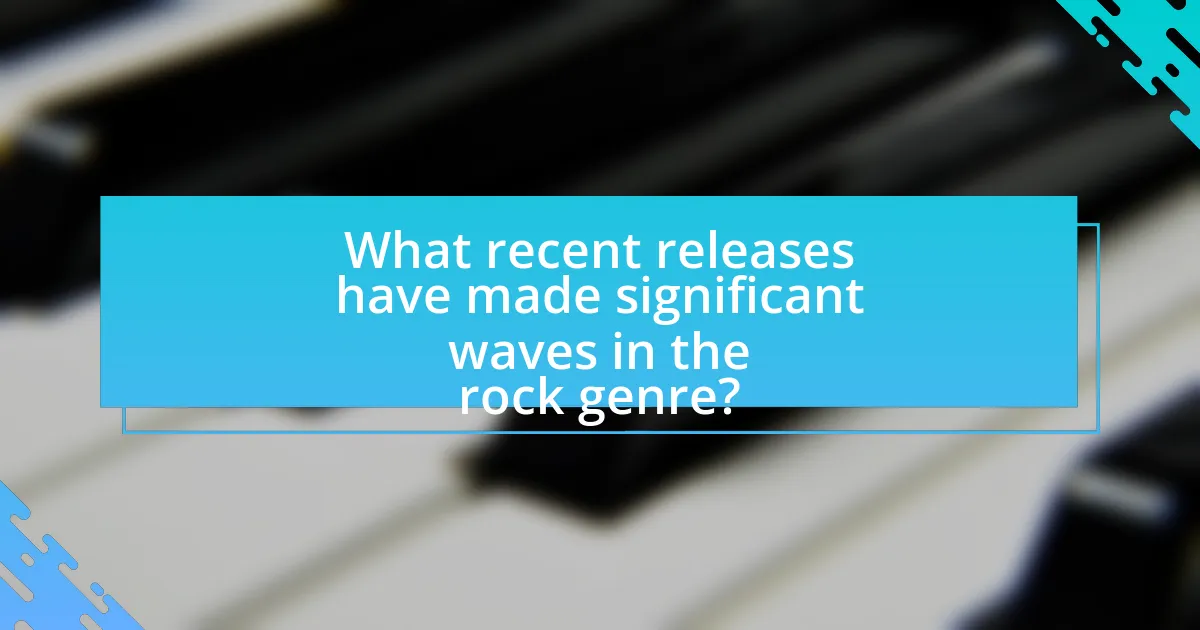
What recent releases have made significant waves in the rock genre?
Recent releases that have made significant waves in the rock genre include “Patient Number 9” by Ozzy Osbourne and “The Boy Named If” by Elvis Costello. “Patient Number 9,” released in September 2022, features collaborations with notable artists like Eric Clapton and Jeff Beck, showcasing Osbourne’s enduring influence in rock music. “The Boy Named If,” released in January 2022, received critical acclaim for its lyrical depth and musicality, reaffirming Costello’s status as a rock icon. Both albums have garnered attention for their innovative sound and strong performances, contributing to the ongoing evolution of the rock genre.
Which albums or singles have received critical acclaim?
Albums and singles that have received critical acclaim include “The New Abnormal” by The Strokes, which won the Grammy Award for Best Rock Album in 2021, and “Fear Inoculum” by Tool, praised for its complex compositions and awarded a Grammy for Best Metal Performance. Additionally, “A Moon Shaped Pool” by Radiohead has been lauded for its innovative sound and emotional depth, receiving a score of 92 on Metacritic. These works exemplify the high standards of artistry and musicianship that resonate with critics and audiences alike.
What themes are prevalent in these recent releases?
Recent releases from iconic rock bands prominently feature themes of nostalgia, resilience, and social commentary. Nostalgia is evident as bands reflect on their past experiences and influences, often evoking a sense of longing for earlier times. Resilience is highlighted through lyrics that address overcoming personal and collective struggles, resonating with listeners facing contemporary challenges. Social commentary is also prevalent, with many songs tackling current issues such as political unrest and environmental concerns, showcasing the bands’ engagement with the world around them. These themes collectively resonate with audiences, reinforcing the bands’ relevance in today’s music landscape.
How do these new works compare to the band’s earlier music?
The new works of the band exhibit a more mature sound compared to their earlier music, showcasing evolved songwriting and production techniques. For instance, the incorporation of diverse musical influences and complex arrangements reflects their growth as artists, contrasting with the simpler structures of their earlier albums. Additionally, lyrical themes in the recent releases often delve deeper into personal and societal issues, indicating a shift from the more straightforward topics of their past. This evolution is evident in tracks that blend genres, demonstrating their willingness to experiment while maintaining the essence of their original style.
What role does nostalgia play in the success of these releases?
Nostalgia significantly contributes to the success of recent releases by iconic rock bands, as it taps into the emotional connections fans have with past music and experiences. This emotional resonance often drives sales and streaming numbers, as seen in the resurgence of interest in classic albums and reunions, which can lead to chart-topping performances. For example, the return of bands like Fleetwood Mac and the Rolling Stones has been met with enthusiastic responses, evidenced by sold-out tours and high album sales, indicating that nostalgia not only enhances fan engagement but also translates into commercial success.
How do fans’ memories of past music influence their reception of new material?
Fans’ memories of past music significantly influence their reception of new material by creating a benchmark for comparison. When fans recall the emotional connections, nostalgia, and cultural significance of previous songs, they often measure new releases against these experiences. For instance, research indicates that nostalgia can enhance the enjoyment of new music, as fans may seek to recapture the feelings associated with their favorite past tracks. This phenomenon is supported by studies showing that familiar melodies and lyrical themes can evoke positive memories, leading to a more favorable reception of new songs that resonate with those past experiences. Thus, the interplay between memory and new music shapes how fans perceive and engage with contemporary releases.
What marketing strategies leverage nostalgia for these comebacks?
Marketing strategies that leverage nostalgia for iconic rock band comebacks include the use of retro branding, limited edition merchandise, and social media campaigns that evoke past memories. Retro branding taps into the emotional connection fans have with the band’s earlier work, often incorporating vintage logos and album art to create a sense of familiarity. Limited edition merchandise, such as vinyl records or reissues of classic albums, appeals to collectors and long-time fans, driving sales through exclusivity. Social media campaigns often feature throwback content, such as old concert footage or interviews, which engage fans by reminding them of their past experiences with the band. These strategies are effective as they capitalize on the emotional resonance of nostalgia, which studies show can enhance consumer loyalty and increase engagement.
How do iconic rock bands maintain relevance in today’s music scene?
Iconic rock bands maintain relevance in today’s music scene by evolving their sound while staying true to their roots. For instance, bands like Foo Fighters and Red Hot Chili Peppers have incorporated modern production techniques and collaborated with contemporary artists, which attracts younger audiences while retaining their original fan base. Additionally, they leverage social media platforms to engage with fans, promote new music, and share behind-the-scenes content, enhancing their visibility and connection in a rapidly changing industry. This strategy is supported by data showing that artists who actively engage on social media see increased streaming numbers and concert attendance, demonstrating the effectiveness of these methods in maintaining relevance.
What strategies do bands use to connect with new audiences?
Bands use social media engagement, collaborations, and live performances to connect with new audiences. Social media platforms like Instagram and TikTok allow bands to share content, interact with fans, and reach wider demographics; for instance, TikTok has been instrumental in reviving older songs and introducing them to younger listeners. Collaborations with popular artists can also attract new fans by leveraging each other’s audiences, as seen when established bands team up with trending musicians. Additionally, live performances, including virtual concerts and festival appearances, create memorable experiences that resonate with potential fans, enhancing visibility and engagement. These strategies are effective in expanding a band’s reach and fostering a loyal fan base.
How do social media and streaming platforms impact their reach?
Social media and streaming platforms significantly enhance the reach of content by providing immediate access to vast audiences. These platforms enable artists to share their music directly with fans, bypassing traditional distribution channels. For instance, in 2020, Spotify reported having over 345 million active users, while platforms like Instagram and TikTok allow for viral marketing through user-generated content, amplifying exposure. This direct engagement fosters community building and encourages sharing, which can lead to increased visibility for new releases, as seen with the resurgence of bands like Fleetwood Mac, whose song “Dreams” gained renewed popularity through a viral TikTok video.
What collaborations or features help bridge generational gaps?
Collaborations between established rock bands and contemporary artists help bridge generational gaps. For instance, the partnership between the legendary band Aerosmith and modern artists like Post Malone on the track “Take Me Home” showcases how blending classic rock with current pop influences can attract diverse audiences. This collaboration not only revitalizes interest in Aerosmith’s music among younger listeners but also introduces the band’s legacy to a new generation, demonstrating the effectiveness of cross-generational features in music.
What lessons can be learned from successful rock band comebacks?
Successful rock band comebacks demonstrate the importance of reinvention, audience engagement, and strategic timing. Bands like Fleetwood Mac and Guns N’ Roses have shown that evolving musical styles while staying true to their roots can attract both old fans and new listeners. For instance, Fleetwood Mac’s “Say You Will” (2003) incorporated contemporary sounds while maintaining their signature harmonies, leading to commercial success. Additionally, effective marketing and leveraging nostalgia, as seen with the reunion tours of bands like The Eagles, can significantly boost visibility and sales. These examples highlight that successful comebacks require a balance of innovation and respect for legacy, alongside a keen understanding of market dynamics.
What best practices should bands consider when planning a comeback?
Bands planning a comeback should prioritize audience engagement, strategic marketing, and authentic musical evolution. Engaging with fans through social media and live events fosters loyalty and excitement, as seen in the successful reunions of bands like Fleetwood Mac, which utilized social media to reconnect with their audience. Strategic marketing, including targeted promotions and collaborations, can amplify visibility; for instance, the return of the band Blink-182 was marked by a well-executed marketing campaign that included teasers and exclusive content. Lastly, evolving musically while staying true to their roots is crucial; bands like The Rolling Stones have successfully adapted their sound over decades, appealing to both old and new fans. These practices collectively enhance the likelihood of a successful comeback.
How can bands effectively engage with their fanbase during a comeback?
Bands can effectively engage with their fanbase during a comeback by utilizing social media platforms to share behind-the-scenes content, announce new music, and interact directly with fans. This approach has been validated by the success of bands like My Chemical Romance, which used social media to build anticipation for their reunion tour, resulting in sold-out shows and increased merchandise sales. Additionally, hosting live Q&A sessions and exclusive listening parties can create a sense of community and excitement among fans, further solidifying their loyalty and involvement.

